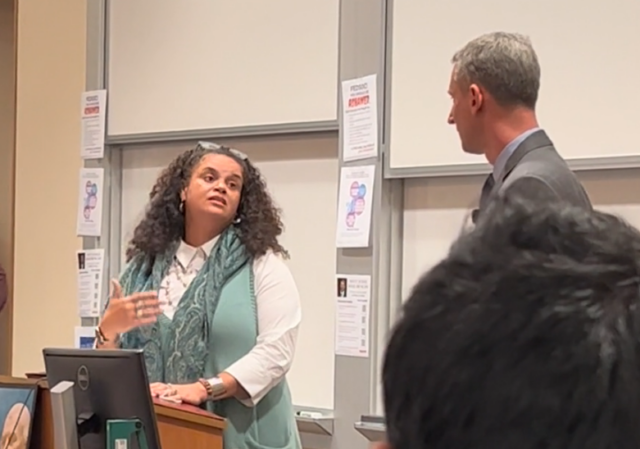Texas Bar Application Adds Questions About Free Speech Following Shout Down at Stanford Law
“Texas’s board of bar examiners made the change after concluding that schools like Stanford—which did not discipline a single heckler—cannot be trusted to attest to an applicant’s character.”

That incident at Stanford has really brought attention to this issue. It’s great to see people responding.
The Washington Free Beacon reports:
Texas Bar Application Adds Questions About ‘Incivility’ and Free Speech in Wake of Stanford Law School Fracas
The state of Texas is updating its bar application to include questions about whether applicants have engaged in “incivility and violations of school policies,” according to a letter from the Texas Supreme Court obtained by the Washington Free Beacon. The change is a direct response to an incident at Stanford Law School last month in which students shouted down a federal judge.
Sen. Ted Cruz (R., Texas) wrote to the bar in March suggesting the change, arguing that Stanford Law School graduates should “be made to answer, in writing, whether they participated in the shameful harassment” of Fifth Circuit appellate judge Kyle Duncan, who was subjected to vulgar heckling when he attempted to deliver prepared remarks. The bar responded in early April, indicating that it planned to ask all applicants “directly” about their involvement in disruptive protests.
Texas’s board of bar examiners made the change after concluding that schools like Stanford—which did not discipline a single heckler—cannot be trusted to attest to an applicant’s character. The state “has historically relied on law schools to report disciplinary matters that should be considered in determining an applicant’s character and fitness for admission to the Texas bar,” Nathan Hecht, the chief justice of the Texas Supreme Court, wrote on behalf of the bar examiners, who evaluate applications to the bar. “School reactions to recent violations of free-speech policies suggest that reliance is not justified.”
All lawyers must pass a “character and fitness” check that screens for values like honesty and civility. If those checks become more focused on disruptive conduct, they could make law students think twice before engaging in that conduct.
Donations tax deductible
to the full extent allowed by law.








Comments
I’m confused. They don’t trust the school but they trust the students themselves? Doesn’t seem very realistic.
There are consequences for lying on the bar exam, and since these dolts insist on filming themselves acting like drunken chimpanzees it’s going to be pretty easy to identify them if they do.
The cover up is always worse than the original transgression–lie on a bar application and get caught, and it’s an uphill battle from there
I heard of such once. From a criminal defense attorney who was asked by a judge’s clerk to brief her on defense points before trial. He did. And was reported to the Bar Association and the Judge for sexual harassment. Because the language he used was graphic.
It was absurd. A young female attorney-law clerk who had neither had proper criminal law training, nor had the capacity to face the real world.
As an older member of the Bar I had an opportunity to discuss the matter with the judge. She agreed that it was absurd. And although she hated the attorney in question, had all charges dismissed. The law clerk was not rehired for her second year.
Every red state should be doing this. It should also be extended to every professional licensing group: doctors, pharmacists, etc.
And if any of those groups balk or halfway enforce it, the Legislatures and governors should be prepared to remove them from the license issuing and enforcement process.
Sen. Ted Stevens, a sitting US Senator, was convicted using Suborned Perjury by the DOJ.
None of those attorneys were ever sanctioned by any Bar, nor the DOJ.
Oh and that same attorney was the lead at DOJ for the Trump Mueller Special Prosecutor.
Void for vagueness.
Put yourself in the student’s shoes. Your grade school teachers teach CRT. At freshman orientation, you are taught DEI and to avoid microaggressions against certain minority groups. In general, the education system teaches you who to please. You work hard to please the (left-wing) professors and get into Stanford Law School. (Congratulations, not a small feat.) At Stanford, you internalize the expectations of the Association Dean for Diversity, Equity and Inclusion and respond to her email urging you to attend the event with Judge Duncan.. Your disruptive conduct even earns her praises during her 6-minute speech. As far as you know, you have done nothing wrong and have worked hard to curry favor with those in authority. (Somehow you don’t stop to think that Judge Duncan is very much in authority.)
So, you are now going to have to explain yourself before the character and fitness committee to gain admission to the bar?